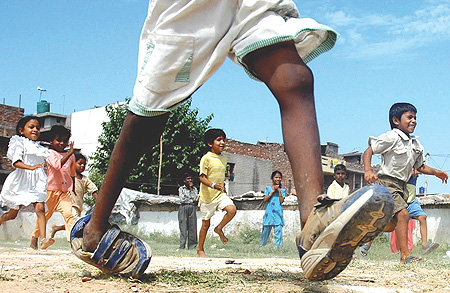A picture can say a thousand words, but it certainly
doesn't have to cost $1,000. In the case of
Photoshare, a picture doesn't cost anything at all.
A free online service of the School of Public Health's
INFO Project, Photoshare boasts an
extensive and constantly growing archive of public
health-related images that nonprofits can use for
documentary and educational purposes.
The often-striking images cover such topics as family
planning and reproductive health,
HIV/AIDS, maternal and child health, environment, democracy
and governance, and humanitarian
assistance.
The site offers such pictures as a determined group of
teachers on their way to school, walking
bicycles through a flooded road in Kenya; and Indonesian
children rinsing off with fresh water,
provided by an aid group, after the Great Tsunami of 2004
destroyed their town.
Users can search the site by topic, keyword, country,
region, project and even a photographer's
name. Photoshare images are credited to the photographers
and agencies, which retain their copyright
but relinquish permission rights. Contributors can even
track use of their images.
Started in 1998, Photoshare arose out of the school's
desire for a better in-house photo
repository and the larger need in the nonprofit community
for images associated with public health.
Its mission is to help nonprofits worldwide communicate
health and development issues through
photography.

A polio-affected boy participates
in an athletic meet organized for slum
children by the nongovernmental organization Pustak in
Chandigarth, India.
Photo by 2006 Pradeep Tewari
|
The project is funded by a grant from the United
States Agency for International Development
and is based at the Center for Communication Programs in
the school's Department of Health,
Behavior and Society.
Photoshare's impressive user list includes the United
Nations, World Bank, Peace Corps, Centers
for Disease Control and Prevention and JAMA, the Journal of
the American Medical Association, to
name a few. Its online database currently contains more
than 13,000 images — and it's about to grow
even more.
Since 2003, the project has held an annual photo
competition to help populate the site and find
the most arresting images.
The Fifth Annual Photoshare Photo Contest, which
kicked off in early August, is open to both
amateur and professional photographers. The deadline for
entries is Nov. 16.
The photos will be judged in December by an
independent panel and the winners announced in
January. Top prize is $1,000 and a Canon digital camera,
with other cash and prize awards for second
place, third place and individual categories.
David Alexander, director of the project and creator
of the photo competition, said that the
contest has proven to be a successful method to mobilize
photographers who want to share their work
for charitable and educational use. Last year, the contest
drew nearly 1,000 submissions, with roughly
70 percent coming from photographers based in developing
nations.
Alexander joined the Photoshare staff in 2002, shortly
after graduating from the Maryland
Institute College of Art, where he majored in photography.
He is responsible for managing and
screening incoming requests, promotion and oversight of new
acquisitions, scanning and retouching
images, providing technical support to Photoshare users and
contributors, and serving as in-house
photographer for the INFO Project (Information and
Knowledge for Optimal Health).
He said that Photoshare each month receives about 90
requests and sends out roughly 500
electronic images, both low-resolution images for Web use
and high-resolution pictures for posters,
brochures, magazines and other publications.
Photoshare accepts nearly all photos that fall within
its topic areas, Alexander said, and many
come from amateur photographers.
The Photoshare collection is intended for the
objective and accurate representation of a real
situation, subject or physical location. The site tells
potential contributors to be aware of country
laws governing photography practices and ethical issues,
and Alexander says that contributors need to
examine whether subjects may experience negative
consequences of having their photo used.
He said that he's constantly amazed by the scope and
quality of submissions.
"You never know what you are going to get when you
open a file. Some are troubling pictures,
perhaps of children suffering from malnutrition, while some
are purely inspirational images," he said.
"They all go to good use."
His favorites? Alexander said he has many. One of them
is last year's contest winner, which
shows a polio-affected boy, waist down, running in a
children's athletic meet organized by a
nongovernmental organization in Chandigarth, India.
The judges called it "a stunning picture with a highly
dynamic foreground," including the boy's
twisted right ankle on the verge of slipping out of his
shoe.
"We don't often get the chance to see the soles of
shoes in photography," the judges wrote in
their comments. "And this one really does it well."
To see all the images or to enter the contest, go to
www.photoshare.org.